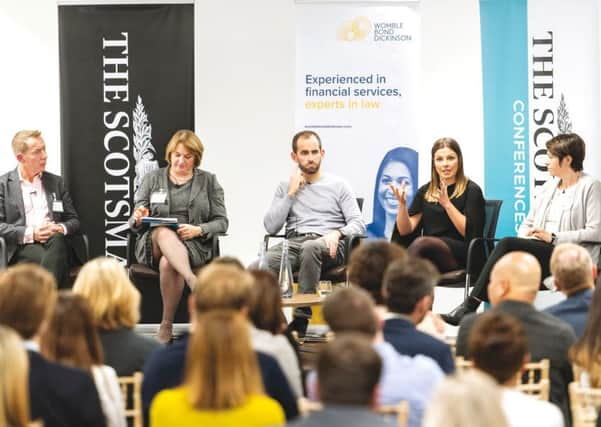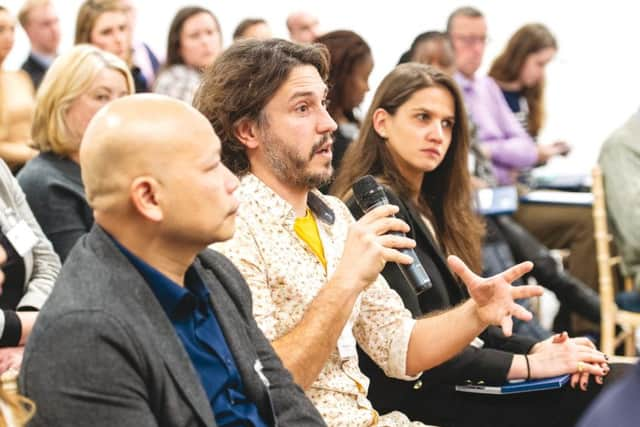Cultural change and technology can tackle financial exclusion


Effective collaboration between a variety of organisations is vital to find solutions to complex challenges, experts told an audience at Tackling Financial Exclusion in Scotland, hosted at the Edinburgh office of legal firm Womble Bond Dickinson (WBD), on Tuesday night, and introduced by Frank O’Donnell, editorial director of The Scotsman, and Jonny Williams, head of WBD’s national financial services team
A wide range of issues were discussed, including the ‘unbanked’, lack of access to branches and cash machines as numbers fall, handling vulnerable customers and the problem of digital exclusion as more financial services are provided online.
Caroline Stevenson, legal director in WBD’s financial services team said: “There are a huge number of barriers to tackling financial exclusion, and they are wide, varied and complex – and one of them is trust. Financial literacy is also a problem, but the big one for me is identity. People without ID cannot get a bank account, or access benefits, and can fall into a self-perpetuating cycle.”


Callum Murray, founder and chief executive of Scottish tech business Amiqus, has been heavily involved in the ProxyAddress project, which associates a specific property with an individual who is homeless or at risk of homelessness, to allow them to access a bank account and have benefits paid in – to stop that cycle of decline.
The project starts in December, initially in Lewisham, south London, and Murray said it was a “proof of concept” to show the project could work in terms of process and legislation. He is confident it will succeed and could spread around the UK.
Amiqus is doing the proof of identity work, alongside a range of partners, including Monzo Bank, Shelter, the Big Issue, the Financial Conduct Authority and iZettle, which provides portable card readers. Murray believes this is an example of where technology could support positive cultural change and extend financial inclusion.
“It’s not easy; these are individuals with complex needs in a vulnerable position,” he added. “At the moment, we rely on systems to make decisions and often, the computer just says no.”


Nicola Anderson, strategic development director at FinTech Scotland, said that she was confident ProxyAddress could work in Scotland, where there is a strong sense of collaboration and small fintech businesses want to do social good.
She told the event: “We have really impactful collaboration in Scotland and a focus on vulnerable customers. We have businesses and people with good ideas who want to solve problems and answer pertinent questions.”
Anderson highlighted MoneyMatiX, which had representatives at the discussion, and its work on financial capability, and those working to help credit unions become more competitive and attractive.
“Collaboration is really important as we strive to address some of those questions around financial inclusion,” she added.
Barry Connolly, managing director of Everyday Banking in Royal Bank of Scotland’s personal banking division, said that real progress had been made in reducing the ‘unbanked’ down to about one million in the UK. There was a big issue around balancing risk and building trust, he added.
Connolly said the Royal Bank of Scotland had learned a lot about financial inclusion, but was still learning, as were all financial institutions.
“Giving everyone access to digital infrastructure would be a major step forward,” he told the audience. However, he recognised physical access to banking was still important for many, highlighting access for customers to the large Post Office network, as well as the Royal Bank of Scotland’s mobile banks and community bankers, who visit specific people in their homes.
Teresa Perchard, chair of the Fairbanking Foundation, also spoke at the event and insisted: “Financial services providers owe a duty of care to their customers and should strive to improve their financial well-being.”
The Foundation has a quality mark for financial products, with large banks like RBS and Barclays signed up alongside many credit unions. Perchard said that Anthony Elliott – who started the Foundation in 2008 to “put things right” in the banking world – was generally positive about what had been achieved.
“The opportunities [provided by technology] are now much greater to really understand customers and their needs,” said Perchard. “We have made real progress in areas like overdraft charges, but there is a long way to go.”
Barry Connolly maintained that banks were a “force for good,” and added: “Banks have come through difficult times, but we have to make customers’ lives better as well as making good profits.”
He also pointed out that basic banking services were still provided for free – which, he said, was a challenge.
The panel had a strong sense that technology should support positive cultural change in financial services, and that it should not just solve “back office” problems, but allow frontline staff to serve customers more effectively.
“It can’t just be about tech, you need to have a deep understanding of customers and what motivates them,” said Connolly.
Callum Murray agreed. “Fundamental change in this area is challenging, it’s costly and systems can be difficult. We need collaboration and cultural change; it’s not about technology alone.” He said the biggest barrier to change was financial services silos: “Everyone has their own systems and processes and while it’s the right thing to do to support a vulnerable customer, it doesn’t always add up from a business case perspective.”
Connolly of the Royal Bank of Scotland said that it was vital to understand the motivation of the “final one million” unbanked and why they were not engaging with financial services.
Stevenson of WBD said there was “no silver bullet” and agreed with Nicola Anderson that it was about “the collective opportunity to collaborate to find solutions and answers”.
Teresa Perchard, concluding the event, said: “The way forward is creating a shared plan across all sectors and having clarity about where we want to get to – and defining success.”
A digital edition can be found here.